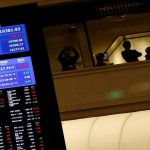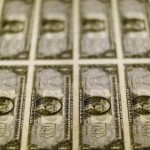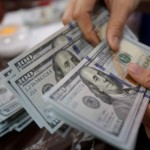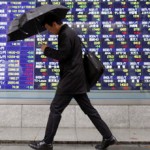Asian stocks turn negative on Fed uncertainty
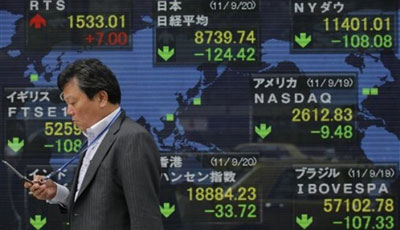
Asian stocks lost steam in choppy trade on Friday, mirroring the lackluster lead from Wall Street amid uncertainty over U.S monetary policy.
In a speech that occurred after the market close, Federal Reserve chair Janet Yellen said that an interest-rate hike “sometime later this year” would likely be appropriate, though the decision hinges on economic data. Yellen was speaking at the University of Massachusetts on Thursday.
The greenback jumped against a basket of currencies after the speech. The euro fell about 0.5 percent to $1.1174 from around $1.1230 whiledollar-yen rose to around 120.27, from around 120.00 before Yellen’s remarks.
“Our view for a December rate hike has not changed,” Cynthia Jane Kalasopatan of Singapore’s Mizuho Bank wrote in a note. “Overall, we acknowledge that some caution prevail amid China’s wobbles and a strong [greenback] but U.S. data releases continue to point to a broad recovery picture. With no major data releases or events, Fed’s policy outlook may be the key driver in markets today.”
The Dow Jones Industrial Average closed down 0.5 percent, withCaterpillar down 6.3 percent on news that the firm will cut up to 5,000 jobs by end-2016 and lowered guidance. The S&P 500 eased 0.3 percent while the tech-heavy Nasdaq Composite more than halved losses in the afternoon trading session to finish 0.4 percent lower.
Nikkei rises 1.2%
Japan’s Nikkei 225 gained ground in the positive turf in the afternoon trading session, as Bank of Japan governor Haruhiko Kuroda said he had a meeting with Prime Minister Shinzo Abe.
Abe said early Friday that he had set out three new goals for “Abenomics” and will target a 20 percent increase in gross domestic product (GDP).
“The Japanese recovery is flagging and authorities are concerned that they are losing momentum and they are trying to restore confidence in the medium term despite the near-term performance,” Steven Englander, global head of G10 FX Strategy at Citibank, told CNBC.
But gains were limited as investors weighed data that showed consumer inflation fell for the first time since April 2013.
The core consumer prices dropped 0.1 percent in August, government data released before the market open showed, underscoring the need for policymakers to offer fresh fiscal and monetary support to bolster a fragile recovery.
“CPI data continues to show a weak acceleration, which suggests that the Japanese central bank may need to do more. That said, the Bank of Japan’s massive 80 trillion yen QQE program is showing signs of crowding out the Japanese Government Bond (JGB) markets,” IG’s Singapore-based market strategist Bernard Aw wrote in a note released early Friday.
“If the BOJ cannot increase its asset purchase program, it will have to explore other options, such as cutting the reserve requirement ratio, or expand its sovereign bond purchases to regional bonds,” Aw added.
Export-oriented stocks turned mixed, with Toyota Motor and Suzuki Motor changing course to edge up 0.3 percent each. However, worries over Volkswagen’s emissions cheating scandal continued to cast a cloud over the auto sector, with Mitsubishi Motors and Honda down 2.8 and 0.3 percent respectively.
Sharp plunged 5.2 percent after the Nikkei business daily reported the company is likely to book a 30 billion yen loss for the April-September half.
A near 3 percent tumble in the shares of industrial robot maker Fanucalso weighed on the bourse.
Mainland indices slump
China’s Shanghai Composite widened losses abruptly to nearly 2 percent by mid-day, with infrastructure and transport-related shares among the hardest-hit.
China Railway Group, China Railway Construction and Maanshan Iron and Steel Company tumbled more than 4 percent each. Airline stocks such as Air China receded 3.2 percent.
Among China’s other indexes, the benchmark CSI300 Index slumped 1.9 percent. Small-caps suffered bigger losses, with the Shenzhen Composite and start-up board ChiNext losing over 3 and 4 percent respectively.
In Hong Kong, the Hang Seng index trimmed losses to 0.3 percent.
ASX slips 0.2%
Australia’s S&P ASX 200 index pared gains by mid-morning trade, weighed down by a change in direction among the major lenders.
Commonwealth Bank of Australia tanked 1.1 percent, while National Australia Bank, Australia and New Zealand Banking and Westpacreceded between 0.7 and 1 percent.
But gold producers held up; Evolution Mining and Newcrest Miningleaped 3.2 and 4.1 percent respectively, thanks to a firmer gold prices for the second straight session overnight.
Myer also outperformed the bourse with a rise of 9 percent, after Citi upgraded its call on the stock to ‘buy’ from ‘neutral.’ Harvey Normanand JB Hi-Fi advanced 0.5 and 0.8 percent respectively.
Kospi drops 0.6%
South Korea’s Kospi index surrendered early gains in early trade, touching its lowest level since September 15.
Losses in heavyweight components likely dragged down the bourse;Samsung Electronics and Posco fell nearly 2 percent each.
SK Telecom, which announced on Thursday plans for a share buyback worth 523 billion won ($438.21 million), recouped losses to rise 0.4 percent.
However, Hyundai Motor surged 2.9 percent on the back of news that its vice chairman and heir-apparent Chung Eui-sun bought shares worth about 500 billion won ($420 million).
Chung, 44, the only son of Hyundai Motor’s chairman Chung Mong-koo, now holds about 1.4 percent of Hyundai Motor after buying 3.16 million shares from Hyundai Heavy Industries, reported Reuters citing a regulatory filing. “It could be taken as Chung Eui-sun’s step in earnest toward succession of the ownership structure,”Park Ju-gun, head of research firm CEO Score, told the newswire.
The news also lifted shares of Hyundai Glovis which soared 5.6 percent.
On the domestic data front, South Korean consumers felt more upbeat about the economy in September, with confidence returning to levels just before the deadly outbreak of MERS in late May, according to the Bank of Korea’s composite consumer sentiment index (CCSI).
Rest of Asia
Taiwan’s weighted index edged down 0.2 percent amid choppy trade, tracking the downbeat sentiment region-wide and as investors weighed the central bank’s decision to lower its benchmark discount rate to 1.750 percent from 1.875 percent, citing the slowdown in global economic growth. This marks the Central Bank of the Republic of China’s (CBC) first rate cut since 2009, sending the local currency to a six-year low of 33.285 versus the U.S. dollar in the previous session.
Meanwhile, the central bank guided the overnight interbank rate lower on Friday, lowering it to 0.30 percent from 0.32 percent a day earlier.
“While the description of the domestic economy didn’t contain any new information or forecasts, the contrast with the description in the June statement underscored the deterioration that occurred in the second quarter. We blame an adverse export shock emanating principally from the U.S. and China,” ING Financial Markets’ head of research Asia, Tim Condon, wrote in a note.
Elsewhere in the region, Singapore’s industrial production fell 7.0 percent in August from a year earlier, wider than the 5.0 percent drop forecast in a Reuters poll and below July’s 6.1 percent decline. On a month-on-month basis, output plunged 3.7 percent, down from the 1.0 percent rise in July.
The benchmark Straits Times index declined 0.6 percent to hover near a one-month trough.
Meanwhile, markets in India and the Philippines are closed for public holidays.
Source: CNBC – Asian stocks turn negative on Fed uncertainty









